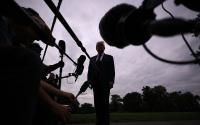17 June 2004Znet /TomDispatch; Tom Engelhardt
I think I can firmly state that, as President Bush has firmly and repeatedly stated, full Iraqi sovereignty has finally been established, or at least has a reasonable foothold -- in the United States and in our media. The weak administrative entity being set up in Baghdad's Green Zone, thanks to a series of backroom deals brokered by Bush special envoy Robert Blackwill and occupation administrator L. Paul Bremer III, and to which that "full sovereignty" is to be transferred on June 30, is already commonly referred to in American newspapers and on the TV news as "the Iraqi government." (Before resigning recently, Lakhdar Brahimi, the UN envoy to Baghdad, who was fleeced in the "negotiating" process, spoke of Bremer"only half in jest" as "the dictator of Iraq.")
So there has indeed been a granting of "sovereignty," even if in the air, so to speak, not on the ground. The Europeans, always ready in the end to give way before Washington, offered a g-string worth of cover at the UN; the Russians had other fish to fry; and the Chinese were undoubtedly clapping their hands, Iraq being the windfall of all times for them. (After all, before the Middle East trumped Asian policy, China stood a reasonable chance of being slotted in as the Enemy of Enemies of the Bush administration's dreams.)
So the new "Iraqi government" has been granted sovereignty in the U.S. by our media thanks to the very language chosen to describe it. As it happens, the real struggle for sovereignty didn't even take place in Iraq, but here, as part of what intelligence expert Thomas Powers recently called our third war (after Afghanistan and Iraq), "an all-out war between the White House and the nation's own intelligence agencies" (to which he might have added part of the military as well). It was the CIA which finally established "sovereignty," destroying, at least for the time being, former exile Ahmed Chalabi, the Pentagon's man in Iraq and head of the Iraqi National Congress, and replacing him with exile Iyad Allawi, their own long-time man and head of the Iraqi National Accord, who is now prime minister of the country. So instead of a neocon administration in Baghdad, we have a CIA one; or put another way, instead of conferring sovereignty on an accused con artist and notorious liar, who reputedly defrauded a Jordanian bank of millions and seems to have stolen reality itself from the Pentagon civilian leadership, the Bush administration conferred it on the head of a former terrorist organization, which committed car bombings in downtown Baghdad back in the days of Saddam Hussein.
The only small problem with the whole discussion of sovereignty, of course, lies in recalcitrant Iraq which is now so darn sovereign that the Pentagon is madly figuring how to: withdraw troops from far-flung garrisons elsewhere on this small planet to reinforce our now-no-longer-occupying army of 138,000 in Iraq; extend the terms of duty of troops assigned to Iraq, despite contracts for the "volunteer" Army that say otherwise; and further bolster and coordinate the mercenary army of private "contractors" already there (New York Times, 6/15/04). This reflects the confidence the U.S. military has in the "sovereign" powers of the new Iraqi regime.
Of course, as Jonathan Schell has pointed out, one of the Bush administration's great fantasies may be that we ever possessed Iraqi sovereignty to give or withhold. In fact, as far as I can tell, there simply is no "sovereignty" in Iraq right now and very little control at all. Oil pipelines are being blown up daily; there are increasingly sophisticated ambushes on the outskirts of and inside Baghdad; near constant car bombings in the central city; assassinations and killings of everyone from second-level officials to former Baathist officers to Shiite truck drivers to university professors to anyone in any way connected to any kind of western organization of any sort.
If you want to get a vivid sense of the state of "sovereignty" (read: armed chaos) in Iraq, check out a recent harrowing account (Reporting Under The Gun in an Ambush Zone, 6/8/04) by the gutsy Daniel Williams of the Washington Post and his gutsy driver, whose full name, tellingly, Williams can't even print ("...because mere association with a foreign organization like the Washington Post can mean death. Someone could find him, even in big Baghdad"). They took a trip through Falluja now (speaking of sovereignty), asLaura King of the Los Angeles Times reminds us (6/13/04), fully in the grip of a fundamentalist version of Islam and in the hands of the insurgents whom the Marines were once supposed to destroy. (Note, by the way, the no-name tagline on that piece too: "An Iraqi special correspondent for The Times in Fallouja contributed to this report.")
Describing a near death ambush and chase in their armored car on the highway, Daniels writes:
"The brazenness and frequency of all kinds of insurgent assaults, from car bombings to mortar attacks and rocket fire to the roadside bombs hidden under trash, in goat carcasses, in date palm logs, inside barrels or under asphalt, have made one more and more likely to actually witness rather than just hear about an act of mayhem....I have covered conflicts in Palestine, Lebanon, El Salvador, Nicaragua, Somalia, Chechnya and Kosovo and, during last year's invasion of Iraq, the fighting in Kurdistan, as well as coup and civil strife in Panama and Haiti, and riots in Miami. Each one presented its own menu of bullets, bombings, anarchy, anger and vulnerable situations... But rarely have I been in a place where danger arrives from so many directions as in Iraq."
Patrick Cockburn reported the everyday Iraqi version of this for the British Independent ("The Rich Have Been Warned to Leave Baghdad," June 8), "Fear of kidnap is pervasive in Baghdad... Kidnap is now so common new words have been added to Iraqi thieves' slang. A kidnap victim is called al-tali or the sheep ."
In an internal Coalition Provisional Authority poll of Iraqis just released and well summarized at Juan Cole's website, the news is even grimmer: 55% of Iraqis would feel safer if our troops left tomorrow; only 18% attributed whatever safety they felt in their neighborhoods to the Iraqi police; 81% claim to have no confidence in Coalition or U.S. military forces; L. Paul Bremer's CPA gets an 11% approval rating; 67% "support or strongly support" the radical young cleric Muqtada al-Sadr as opposed to 23% for our new prime minister Allawi.
Sociologist Michael Schwartz offers a sane and sober assessment of the nature of Iraqi "sovereignty." This sort of analysis should practically be a media given -- before anyone starts writing about "the Iraqi government."
[This article first appeared on Tomdispatch.com, a weblog of the Nation Institute, which offers a steady flow of alternate sources, news, and opinion from Tom Engelhardt, long time editor in publishing and author of The End of Victory Culture and The Last Days of Publishing.]






